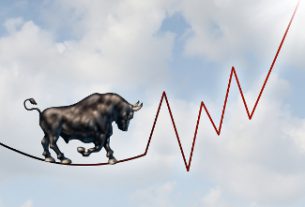Last week saw stock markets having perhaps their worst week since the financial crisis. All major stock markets entered correction territory in record time, with the Dow Jones, S&P 500, and Nasdaq all losing over 10% of their value in a little over a week. The Dow Jones suffered its largest single-day points drop ever, and it’s very likely that the only thing keeping markets afloat right now is a little support from the Plunge Protection Team.
The twists and turns that have roiled markets this week haven’t been any kinder to investors, with alternating drops and rallies, and so much intraday volatility that it’s many a professional stock trader’s dream. But for investors who are in it for the long haul, and whose retirements are resting on the performance of their investment portfolios, watching stock markets can be an exercise in frustration, if not sometimes sheer terror.
If your retirement portfolio is heavily invested in stocks, and you’re within a decade or so of retirement, the events of the past two weeks should have you taking a good, hard look at your investments. Sticking to the strategy you’ve been using for the past 3-4 years, or even the past 10+ years, may no longer be sufficient. You’ll have to go back to 2008 to find a similar period of stock market volatility.
Learning the lessons that investors learned back then should help you inform your investment decisions going forward. You’ll need to take three simple steps to reassess your investment plans and make sure that your savings don’t go up in smoke.
1. Take a Second Look at Your Investment Strategy
With the Federal Reserve’s emergency rate cut on Monday, it’s clear that the continued performance of stock markets will be highly dependent on central bank liquidity. But as we found out in 2007 and 2008, even hundreds of billions of dollars in bailouts wasn’t enough to keep stock markets from crashing hard.
Stock markets are now so divorced from economic fundamentals that they’re due for an even more severe correction than what we’ve seen so far. For investors who are still dependent on stocks for a significant portion of their investment gains, the outlook for this year is poor. And if the coming crisis is anything like 2008, expect your stock investments to lose at least half of their value.
Since stocks make up such a large percentage of so many investors’ portfolios, the outlook for many investors is poor. Now is the time to take a second look at your investment strategy, figure out what the next 5-10 years will bring in terms of the economy and stock markets, and start planning for a new investment strategy.
2. Think About Asset Allocation and Portfolio Diversification
Portfolio diversification is recommended for investors at all stages of their investment, but especially at the onset of a financial crisis. True portfolio diversification doesn’t just mean investing in a variety of stocks and bonds, it means investing in other asset classes such as precious metals, commodities, or real estate. Many investment advisers may recommend against holding gold in an investment portfolio, or investing at most 2-3% of your portfolio in gold. But investors who held larger percentages of their portfolios in gold during 2008 outperformed those who didn’t. In fact, investors who held 30% of their portfolios in gold not only outperformed all-stock portfolios during the worst part of the financial crisis, those portfolios are also still worth more today.
You may read a lot about buying and holding, dollar cost averaging, and not selling assets in reaction to stock market dips. But while that may or may not be helpful advice for someone with 20 or 30 years to go before retirement, it isn’t helpful for someone 5-10 years from retirement.
Investors who took big losses in 2008 took years to recoup those losses. Some may have sold near the bottom in 2008 and 2009, and may not have gained back any of their losses. If you’re nearing retirement, you can’t afford to take 20, 30, or 50% losses. You need to take concrete steps today to maximize the value of your retirement savings when you retire 5-10 years from now.
3. Prepare for a Crash
There’s more and more evidence that the economy is headed for a crash. The “everything bubble” has been years in the making and is in the process of bursting. The coronavirus is the pin that is popping that bubble, and we haven’t even begun to see the effects of it. If stock markets are dropping 10% and more just because of fears of the virus, just wait until supply chains and small businesses are affected, and until areas of the US undergo quarantines.
For the economy and for investors, the worst is yet to come. Investors have to ask themselves if they’re prepared for the crash. They may understand that losses are inevitable, depending on what their investment strategy is. As long as they’re prepared for those losses, they’ll be able to withstand them. But investors who aren’t prepared, who aren’t paying attention to what is going on in markets, may find that their dreams of a comfortable retirement remain just a dream.
This article was originally posted on Goldco.





